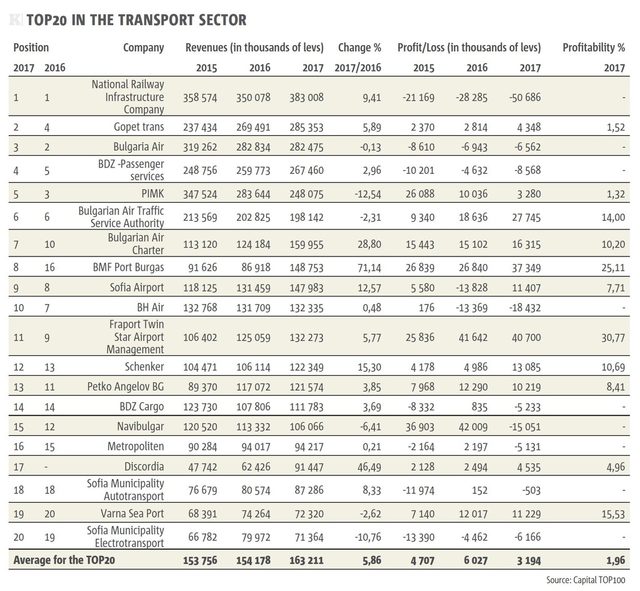• Low-cost airlines brought 30% growth of passenger numbers at Sofia Airport in 2017, to almost 6.5 million.
There are two factors that drive Bulgaria's transport sector since the beginning of 2018: budget airlines drive business at the country's airports; Bulgarian-registered long-haul trucks continue to face obstacles on the roads of Western Europe.
The first 20 companies in the transport sector report a rise in revenues of over 200 million levs in 2017, compared to a year earlier, representing growth of almost 6%. Transport is also the sector with the largest number of loss-makers - nine out of the 20 largest. Unsurprisingly, six of them are in state or municipal ownership.
Just like in 2016, National Railway Infrastructure Company is leader by revenue. Equally, its loss has continued to grow and has already reached 50 million levs.
Deterioration of financial results is also observed in other state-owned companies of the railway segment. In the case of BDZ Freight the financial loss is combined with a loss of market share to competitors. BDZ Passenger Transport company, which has no competitors in its segment, had its bank accounts frozen by creditors in 2018 and currently it relies on financial assistance from the state.
As usual, the good news comes from the private sector. Freight forwarding services company Gopet Trans has grown steadily in recent years and is second in the ranking, entering for the first time among the top three in 2017. The biggest revenue gainer with 71% increase is the concessionaire of Port of Burgas, BMF Port Burgas, which has doubled its turnover compared to its state owned competitor Port of Varna, 19th in ranking.
The biggest players on the roads
Gopet Trans, the largest privately-owned company in the sector, increased its revenue in 2017 by 6%. It was founded in 1995 by Petar Petrov and his wife with the goal to become a medium-sized European company and offer quality groupage service in the Balkan region.
The company has a network of offices in Greece, Romania, Austria, Poland and Spain. Since 2014 it has been developing intermodal (i.e. combined) shipments. The services started with an intermodal train linking the city of Stara Zagora with Ruse, on the Danube river, and the Romanian town of Curtici and from the private Rail Port Arad terminal trains traveled to Genk, Belgium and the United Kingdom.
The network of endpoints that could be reached by train gradually expanded to northern France, Austria and Poland. In 2017 the company added maritime container shipments to its portfolio. The Middle East and Africa are the main destinations from the Greek ports of Thessaloniki and Piraeus. According to the company's latest data, the aim is to offer shipments combining transport by road, rail and water.
Freight transport company Discordia reported the biggest growth rate among the top 20 in the sector in 2017. The revenues of the company increased by 46.5% year-on-year on the back of expansion of its business on all markets where it operates, says owner Hristo Hristov. The company, which started operations from scratch with two trucks 25 years ago, currently operates 450 and works mainly in Europe and Turkey. Hristov sees Discordia as an influential agent in Europe in 10 years' time, imposing standards in the transport business.
Plovdiv-based PIMK moves to 5th spot in 2017 from 3rd place the year before. Through its subsidiary Terminali PIMK won a 27-year concession contract for the operation of the intermodal terminal near Plovdiv. The company with the largest number of trucks in Bulgaria is focusing increasingly on intermodal transport. The concessionaire will need to invest an additional 15 million levs in the terminal that was built with funding from the EU's Operational Program Transport. Out of the total, 2.23 mln levs must be invested in the first two years of the concession.
In 2016, PIMK also invested in freight rail transport by setting up PIMK Rail Company, purchasing locomotives and pocket wagons for trailers. Having won the concession contract for the terminal in Plovdiv, PIMK also launched an intermodal train to Çerkezköy, Turkey, which can carry 34 trailers. The next destination from Plovdiv is Wels, Austria which will be serviced by one train twice a week.
Expanding the development of intermodal transport is not just a whim. Clouds hangs over the European future of Bulgarian-based international road transport companies. Western Europe's protectionist policy led by France aims to reduce competition from countries located on the periphery of the European Union.
Businesses have estimated that if the restrictions in the Mobility Package 1 proposed by the European Commission are adopted by the European Parliament (a vote is expected in the middle of next year), they will cut off the market 3,000 Bulgarian trucks per day and will drastically reduce the competitiveness of the Bulgarian road haulage sector.
Spectacular growth
BMF Port Burgas, concessionaire of two cargo terminals at the Black Sea port of Burgas, boasts the highest annual revenue growth rate among the top 20 companies in the transport sector in 2017. The company, owned by Advance Properties of the Domuschiev brothers Georgi and Kiril, grew its revenue by 71% to 148 milion levs and reported a profit of 37.3 million levs.
The port concessionaire is more successful than the other maritime business of the Domuschiev brothers - Navigation Maritime Bulgare (Navibulgar). The KG Maritime Shipping company, which acquired a majority stake in Navibulgar from the state in 2008, has requested the Court of Arbitration at the Bulgarian Chamber of Commerce and Industry to reduce the buyer's commitments in the privatization contract related to the tonnage of the fleet and the number of employees due to the difficult times for the shipping industry. The initial decision of the arbitration authority granting the request could have rescued the owner from paying about 55 million levs in penalties but the Supreme Court of Cassation revoked the disputed arbitration award in a final ruling.
Thanks to the privatization of Navibulgar BMF Port Burgas has become a concessionaire of Burgas port facilities where it operates bulk cargo terminal Burgas-East 2 (since 2012) and container terminal Burgas-West (since 2013).
The company recently announced that it has invested 99 million euro in the two terminals thus far. Part of the investment was used to build a tax warehouse for fuels, liquefied propane-butane discharging facilities, a diesel discharge site and a silo complex for grain cargo processing.
As of last year, Aurubis Bulgaria, the copper smelter in Srednogorie region, became a major provider of loads to BMF Port Burgas. A new warehouse for processing and storing of copper concentrate worth 15 million euro and sulfuric acid storage terminal worth 14 million euro were built for the needs of Aurubis. The investments were made by BMF Port Burgas, while the copper plant rented the facilities for a minimum of 20 years with a guarantee to provide certain volumes of cargo. At the moment two procurement orders for updating the business development plans of Burgas-East 2 and Burgas-West terminals are being implemented.
The government also planned investment in Burgas port with state-owned enterprise Port Infrastructure announcing a 13.5 million levs tender for deepening of the port both in the area operated by BMF Port Burgas and at the terminals of other concessionaires. Last summer, however, the order was cancelled, followed by orders for seabed exploration in the area.
Passenger traffic
All of Bulgaria's three main airports - in Sofia, Varna and Burgas reported a strong year in 2017, as their business flourished on the wings of low-cost airlines bringing more tourists both to the capital and the two cities on the Black Sea coast. Fraport Twin Star Airport Management, the concessionaire of the airports in Varna and Burgas, reported a 6% increase of revenue for last year. After its successful year 2016 the company initially expected to keep traffic volumes unchanged or see a slight drop in the number of Russian tourists following the reopening of the Turkish market to them. Indeed, Russian tourists decreased by 11% last year but the drop was compensated by tourists from the UK, Germany, Israel, Norway and Poland, and ultimately traffic at both coastal airports increased.
Passenger traffic at Burgas Airport grew by 3.59% year-on-year to 2.9 million passengers in 2017, while traffic at Varna Airport jumped by 16.64% to 1.9 million passengers helped by the launch of a Wizz Air base and Ryanair flights. This year, passenger numbers are expected to surpass 3.3 million at Burgas Airport and 2.1 million at Varna Airport.
State-owned Sofia Airport posted revenue growth of almost 13% in 2017. The result is not surprising considering that the number of passengers at the airport in the Bulgarian capital jumped by 30.3%, reaching nearly 6.5 million, and the number of aircraft landings and takeoffs increased by 11.3%. This year, the number of passengers has continued to rise thanks to Wizz Air and Ryanair.
Unlike the successful airports, flag carrier Bulgaria Air saw its revenue remaining little changed last year, compared to 2016. For a third year running, the company closed 2017 in the red, with its loss also little changed compared to the prior-year figure.
At the opposite end among airlines is Bulgarian Air Charter with 29% revenue growth in 2017. The company, majority owned by Evgeny Isaevich Musika, operates 10 airplanes and its main activity is charter passenger transport to and from the airports in Varna and Burgas. The company's main destination is Germany, with its aircraft also flying to destinations in Israel, Poland, Denmark, Slovakia, Austria, the Czech Republic, Switzerland, and Italy.

• Low-cost airlines brought 30% growth of passenger numbers at Sofia Airport in 2017, to almost 6.5 million.












